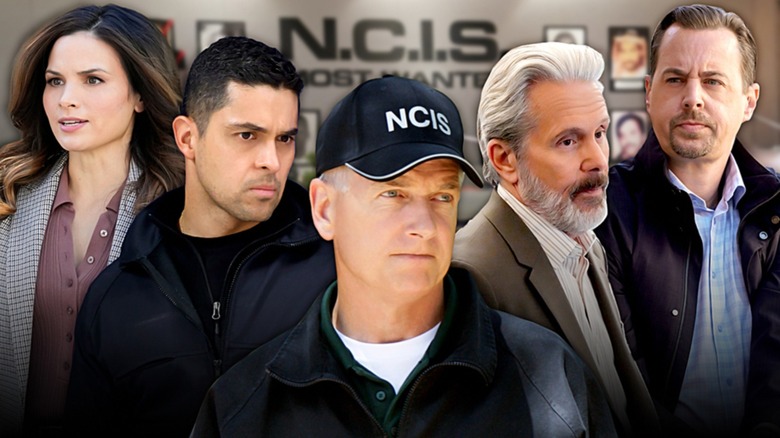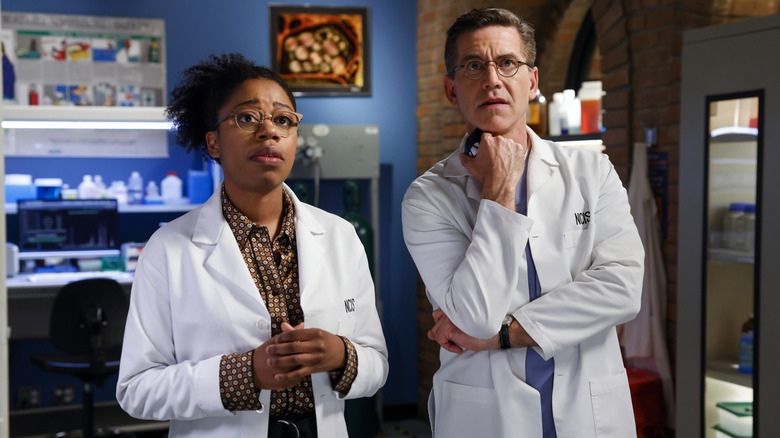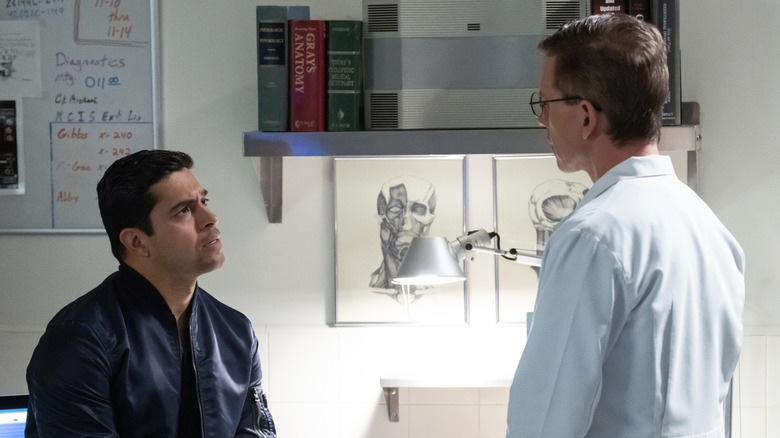NCIS' Biggest Crime Solving Mistakes Debunked By Our Expert And Former FBI Agent
"NCIS" takes every last bit of its danger-laden drama seriously. Still, any show that traffics in fictional crimes and disasters is bound to deviate from the path of hard investigative facts after 20-plus seasons. The show has applied some dramatic license to its cases over time, which means what you see on screen isn't necessarily what you get in real life.
At least that's how it goes, according to our expert, Bobby Chacon, a retired FBI agent who specialized in forensics for 19 of his 27 years on the job. Is it possible to get a quick result from blood spatter evidence? How long does it take for forensic test results to arrive in the real world? And can colleagues help each other when they land in significant hot water, as many "NCIS" team members have done for one of their friends throughout the series' run? Chacon has the answer to those queries, and it seems that not everything the drama puts on-screen reflects how crime labs work in the real world. Here's just some of what "NCIS" gets wrong about crime scene investigation.
Forensic evidence takes time - and isn't the only thing that makes a successful case
"NCIS" tends to crunch down the amount of time in which evidence is processed, including DNA testing and the handling of evidence. Naturally, in the real world, crime scene investigators require more time. "Depending on the exact evidence being examined and subject to scientific processes, the time to get results can vary from a few days to a few weeks and even a few months," reported Bobby Chacon. He says that the wait time can change depending on expediency and caseload, which may slow or speed up the amount of time needed.
What of the team's occasional reliance on blood spatter evidence to solve crimes? Chacon notes that sometimes, the science is still helpful and definitely admissible in court but it doesn't tell the entire legal tale. "Such evidence is never used to "solve" a crime. Blood spatter, like almost all other forensic evidence, is almost never determinative of guilt (with few exceptions such as DNA). Instead, blood spatter analysis and other forensic evidence are used to build a picture of what happened, and this picture is hopefully supported by other independent evidence and witness testimony," he explained. As in many cases on "NCIS," this proves to be part of a logic puzzle that investigators must solve and make sense of for juries.
Chacon points out that toxicology, bloodwork, fingerprints, and DNA are the most reliable forensic sciences. The least reliable? Shoe print, hair and fiber evidence, and bite marks. "These simply leave too much to interpretation and less to science," he said, noticing that bite mark evidence has increasingly been discredited since the 2000s.
Very few forensic scientists end up working on cases involving their own family members
Any fan of 'NCIS" worth their salt will recall that the team often takes on cases with personal weight. For instance, the case surrounding the death of the wife and daughter of Leroy Jethro Gibbs (Mark Harmon) – who's getting a dark prequel that may highlight this tragedy — forms a central focus point for much of the series' action. Nick Torres (Wilmer Valderrama) and many other team members have dealt with cases involving relatives or striking close to the heart of their personal lives — troubled friends or former colleagues.
Bobby Chacon reports that this doesn't happen too often in real life — and when it does, naturally, the investigator in question is recused from the case. "Personal connections to the crimes we investigate are extremely rare, and while they do occasionally occur, the policy is to remove the connected investigator from that investigation," he said. Often, it has nothing to do with any emotions inherent in the situation but because prosecuting attorneys might cast a pall on the case's accuracy and fairness to the jury.
Occasionally, "NCIS" team members find themselves trying to solve crimes related to terrorist activities, and sometimes those activities are carried out by ex-military members. Chacon notes that this has occurred in real life, but much less frequently there. "When members of the military participate in terrorism the media reports on it extensively so I think the general public has an accurate view of the extent to which it happens," he revealed.
This all shows that while "NCIS" is a real thing outside of the show, the stuff they portray doesn't always reflect the science that happens behind the scenes.


